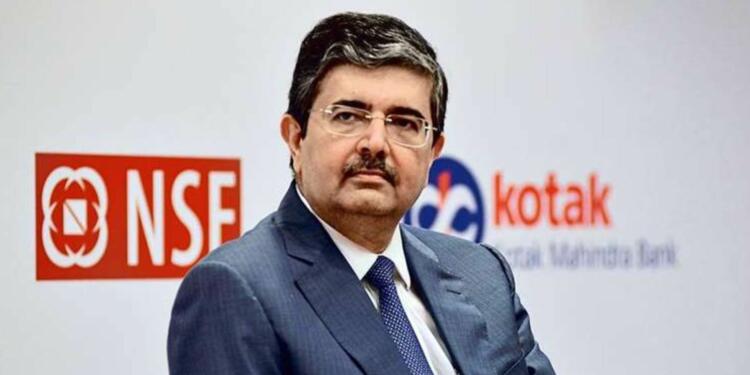Uday Kotak, the renowned Indian banker and billionaire, has long been a stalwart in the financial world. As the founder and former CEO of Kotak Mahindra Bank, his name has been synonymous with success and innovation. However, recent events have taken a drastic toll on his fortune, with more than Rs 10,000 crore wiped out in just a single day.
The Rise of Uday Kotak
Uday Kotak’s journey is a quintessential tale of rags to riches, marked by resilience, determination, and an unwavering commitment to excellence. Born into a middle-class family in Mumbai, India, on March 15, 1959, Kotak’s upbringing instilled in him the values of hard work and perseverance from an early age.
After completing his Bachelor of Commerce degree from Sydenham College, Mumbai, Kotak pursued a Master of Business Administration (MBA) from the Jamnalal Bajaj Institute of Management Studies. Armed with a solid academic foundation, he embarked on his professional journey with a keen interest in finance and entrepreneurship.
In 1985, at the age of 26, Uday Kotak took a bold step and founded Kotak Capital Management Finance Ltd., laying the foundation for what would later become one of India’s leading financial conglomerates. Operating initially as a non-banking financial company (NBFC), Kotak Capital Management Finance Ltd. provided bill discounting and investment banking services, catering primarily to corporate clients.
Estb. Kotak Mahindra Bank
The turning point in Kotak’s career came in 2003 when he orchestrated the transformation of Kotak Mahindra Finance Ltd. into a full-fledged banking institution, thereby establishing Kotak Mahindra Bank. This strategic move allowed Kotak to expand the scope of his operations and tap into the vast potential of India’s banking sector.
Under Uday Kotak’s astute leadership, Kotak Mahindra Bank experienced unprecedented growth and success, emerging as a formidable player in the Indian banking industry. Kotak’s visionary approach to banking, coupled with his focus on innovation and customer-centricity, set the bank apart from its competitors.
Kotak Mahindra Bank’s exponential growth trajectory under Kotak’s stewardship is a testament to his visionary leadership and strategic acumen. The bank diversified its product offerings, expanded its branch network, and embraced technology to enhance operational efficiency and customer experience.
Beyond his role as a banker, Uday Kotak is widely regarded as a thought leader and visionary in the Indian financial landscape. His insights into market trends, regulatory developments, and economic policy have earned him respect and admiration from peers and industry stakeholders alike.
Moreover, Kotak’s contributions extend beyond the realm of banking, as he actively engages in philanthropy and social initiatives aimed at fostering inclusive growth and development. His commitment to corporate social responsibility underscores his belief in using business as a force for positive change in society.
Uday Kotak: The Billionaire Titan
Uday Kotak’s ascent to billionaire status is a testament to his exceptional business acumen, strategic foresight, and relentless pursuit of excellence. As the founder and former CEO of Kotak Mahindra Bank, he has amassed immense wealth and wielded significant influence in the banking industry, both in India and on the global stage.
Kotak’s status as a billionaire is underscored by his substantial ownership stake in Kotak Mahindra Bank, coupled with his diversified investment portfolio and other business ventures. According to Forbes and other global wealth indices, Uday Kotak consistently ranks among the wealthiest individuals in India and the world.
His vast fortune not only reflects his personal success but also symbolizes the growth and prosperity of Kotak Mahindra Bank under his leadership. As a pioneer in the Indian banking sector, Kotak has played a pivotal role in shaping the industry’s trajectory and setting new benchmarks for performance and innovation.
Beyond his financial achievements, Uday Kotak is known for his philanthropic endeavors and commitment to social impact. Through the Kotak Education Foundation and other charitable initiatives, he has championed causes related to education, healthcare, and community development, aiming to empower underprivileged individuals and uplift marginalized communities.
Kotak’s philanthropic efforts extend beyond traditional corporate social responsibility, reflecting his belief in creating sustainable change and fostering inclusive growth. His initiatives focus on promoting education and skill development, enhancing healthcare infrastructure, and supporting entrepreneurship and livelihood opportunities for disadvantaged groups.
Moreover, Uday Kotak’s leadership style emphasizes the importance of ethical business practices, corporate governance, and stakeholder engagement. As a prominent figure in India’s corporate landscape, he advocates for transparency, accountability, and responsible leadership, setting high standards for business integrity and corporate citizenship.
Also Read: Major Announcements: Elon Musk With Tesla & Starlink All Set For His Arrival
The RBI’s Intervention
The Reserve Bank of India’s (RBI) decision to impose restrictions on Kotak Mahindra Bank’s operations sent shockwaves through the financial industry, triggering a significant downturn in the bank’s share prices and market capitalization. This unprecedented move by the central bank was driven by mounting concerns over the bank’s IT infrastructure and compliance issues, which had been under scrutiny for some time.
Examination of the Reasons Behind the RBI’s Action
The RBI’s decision to intervene in Kotak Mahindra Bank’s operations was rooted in a series of assessments and inspections conducted over the past two years. During this period, the RBI closely scrutinized the bank’s IT systems, focusing on aspects such as cybersecurity, data management, and regulatory compliance.
The examinations revealed significant deficiencies in Kotak Mahindra Bank’s IT infrastructure and risk management framework, raising red flags about the bank’s ability to ensure the safety and security of customer data and transactions. Specifically, the RBI cited instances of non-compliance with corrective action plans issued by the regulator, highlighting inadequacies, inaccuracies, and sustained failures to address identified issues.
Moreover, the RBI expressed concerns about the frequency and severity of service disruptions experienced by Kotak Mahindra Bank’s core banking system and digital banking channels. These outages not only inconvenienced customers but also raised doubts about the bank’s operational resilience and ability to maintain uninterrupted service delivery.
In light of these findings, the RBI concluded that immediate corrective action was necessary to mitigate risks to customers and uphold the stability of the financial ecosystem. Consequently, the central bank imposed restrictions on Kotak Mahindra Bank, prohibiting the onboarding of new customers via mobile and online channels and the issuance of fresh credit cards until the identified deficiencies were remedied to its satisfaction.
Impact of the RBI’s Directive on Kotak Mahindra Bank’s Share Prices and Market Capitalization
The RBI’s intervention had a profound impact on Kotak Mahindra Bank’s financial performance and market valuation. The announcement of regulatory restrictions triggered a sharp decline in the bank’s share prices, causing a loss of investor confidence and eroding market capitalization.
On the day of the RBI’s directive, Kotak Mahindra Bank’s shares plummeted by approximately 11%, with the stock closing significantly lower than its opening price. This dramatic decline wiped out billions of rupees in shareholder wealth, including a substantial portion of Uday Kotak’s personal net worth, given his significant ownership stake in the bank.
Furthermore, the imposition of regulatory restrictions cast a shadow over Kotak Mahindra Bank’s short-term prospects, with analysts predicting limited upside potential for the stock in the near term. The uncertainty surrounding the bank’s ability to address regulatory concerns and restore investor confidence weighed heavily on market sentiment, exacerbating the downward pressure on share prices and market capitalization.
The Fallout
The fallout from the Reserve Bank of India’s (RBI) intervention in Kotak Mahindra Bank’s operations reverberated throughout the financial ecosystem, resulting in significant financial repercussions for Uday Kotak, other stakeholders, and the broader market.
Analysis of the Financial Repercussions
Uday Kotak, as the founder and major shareholder of Kotak Mahindra Bank, bore the brunt of the financial fallout from the RBI’s regulatory action. The steep decline in the bank’s share prices on the day of the announcement translated into a massive erosion of Kotak’s personal net worth. Reports indicated that Kotak’s net worth plummeted by over Rs 10,000 crore in a single day, representing a staggering loss of wealth for the billionaire banker.
Other stakeholders, including institutional investors, mutual funds, and insurance companies, also experienced substantial losses as a result of Kotak Mahindra Bank’s share price decline. Mutual funds, which held a significant stake in the bank, saw their portfolio values diminish by billions of rupees, while insurance companies suffered similar losses due to their exposure to Kotak Mahindra Bank’s stock.
Also Read: S Jaishankar’s Prophecy: India’s Retort in the Wake of Potential Threats like 26/11
Explanation of Kotak’s Net Worth Plunge
The precipitous drop in Uday Kotak’s net worth can be attributed to the substantial decline in the value of his shareholding in Kotak Mahindra Bank. As the founder and largest shareholder of the bank, Kotak’s personal wealth is closely tied to the performance of Kotak Mahindra Bank’s stock. Therefore, any adverse developments affecting the bank’s operations or market perception can have a profound impact on Kotak’s net worth.
In this case, the RBI’s imposition of regulatory restrictions on Kotak Mahindra Bank’s operations triggered a sharp sell-off in the bank’s shares, driving down their market price and eroding shareholder value. As a result, the value of Kotak’s equity stake in the bank experienced a significant decline, leading to the substantial loss of wealth witnessed on the day of the regulatory announcement.
Assessment of Broader Implications
The broader implications of the RBI’s intervention extend beyond Uday Kotak and individual stakeholders to encompass the overall stability and reputation of Kotak Mahindra Bank, as well as the wider financial industry.
For Kotak Mahindra Bank, the regulatory restrictions imposed by the RBI pose immediate challenges to its growth prospects and operational efficiency. The limitations on customer onboarding and credit card issuance could hamper the bank’s ability to attract new business and expand its customer base, potentially impacting revenue generation and market competitiveness in the short term.
Mutual funds and insurance companies with significant investments in Kotak Mahindra Bank face portfolio losses and heightened risk exposure due to the bank’s uncertain outlook. The decline in the bank’s share price may prompt these institutional investors to reassess their asset allocations and risk management strategies, potentially leading to portfolio reallocations and adjustments.
Moreover, the regulatory scrutiny and negative publicity surrounding Kotak Mahindra Bank’s compliance and IT infrastructure issues could tarnish its reputation and erode investor trust in the broader banking sector. The incident underscores the importance of robust risk management practices and regulatory compliance in safeguarding financial stability and preserving market confidence.
Uday Kotak’s Response
In the wake of the RBI’s regulatory restrictions, Uday Kotak swiftly responded with a commitment to addressing the underlying issues and restoring confidence in Kotak Mahindra Bank’s operations. Expressing concern over the regulatory action, Kotak emphasized the bank’s dedication to compliance and risk management, vowing to work closely with the RBI to swiftly resolve the identified deficiencies.
Kotak Mahindra Bank has embarked on a comprehensive review of its IT systems and governance practices to strengthen its operational resilience and regulatory compliance. The bank has allocated significant resources to enhance its IT infrastructure, cybersecurity measures, and risk management protocols, aiming to address the concerns raised by the RBI and preempt any future regulatory challenges.
Despite stepping down as CEO in September, Uday Kotak remains actively involved in guiding the bank’s strategic direction and overseeing its transformation efforts. As a non-executive director and influential stakeholder, Kotak continues to play a pivotal role in shaping Kotak Mahindra Bank’s future trajectory and upholding its commitment to excellence and integrity.
Looking Ahead
The long-term impact of the RBI’s intervention on Kotak Mahindra Bank and Uday Kotak’s legacy remains subject to speculation and uncertainty. While the regulatory restrictions pose immediate challenges to the bank’s growth and reputation, they also present an opportunity for Kotak Mahindra Bank to reinforce its commitment to regulatory compliance and operational excellence.
Regulatory reforms and industry changes prompted by this incident are likely to reshape the banking landscape in India, with a renewed focus on risk management, corporate governance, and technological resilience. The incident underscores the importance of proactive regulatory oversight and industry collaboration in safeguarding financial stability and investor confidence.
Throughout his career, Uday Kotak has demonstrated remarkable resilience and adaptability in navigating challenges in the ever-evolving financial landscape. From founding Kotak Mahindra Bank to leading its transformation into a leading banking institution, Kotak has consistently displayed visionary leadership and strategic foresight.
Despite facing significant setbacks, Uday Kotak remains a formidable figure in India’s banking sector. His response to adversity and commitment to addressing regulatory concerns will shape the future trajectory of Kotak Mahindra Bank and his own legacy. As stakeholders await further developments, the story of Uday Kotak serves as a reminder of the complexities and uncertainties inherent in the world of finance.
Also Read: From Glory to Gloom: Hurun Global Unicorn Index 2024 Reveals Surprising Trends

























